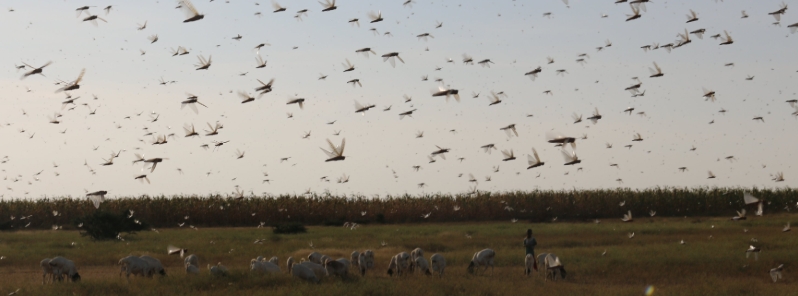Massive swarms of locusts invade Saudi Arabia

Vast swarms of locusts are invading agricultural areas across Saudi Arabia after countries in the Horn of Africa struggled with the biggest outbreak in decades.
The swarm was confirmed to be from East Africa, according to Mohamad Al-Shammrani, director of combating locusts at the Ministry of Environment, Agriculture, and Water.
The swarms were reported in four Saudi regions namely Riyadh, Qassim, Hail, and the Eastern Province. Authorities in the country said they have doubled the daily aerial sprayings to contain the insects.
Crops that were ravaged by locusts in Jazan, Asir, Al-Baha, Al-Leith, Qunfodah, and Makkah are being fought by specialized teams. The environmental conditions in these regions allowed the insects to grow and lay eggs.
"We’ve combated locusts on a daily basis from the beginning of January to the end. We exterminated the first generation of the swarms, which attacked Jazan all the way to the Makkah region," said Al-Shammrani.
"We targeted two swarms of locusts in Qunfodah and Al-Leith."
Wind movement also heavily influenced where locusts end up. This is what helped huge swarms spread across the regions of Al-Qassim, Hail, and the Eastern Province. Combat teams said they have been working persistently to track the movement of swarms and conduct aerial sprayings.

"We use spraying aircraft in rugged areas and terrain. All the insecticides are approved by the Food and Agriculture Organization," said Al-Shammrani.
Locusts have the tendency to multiply during rainy weather, especially in areas high in humidity. Dry conditions followed by wet conditions– drought followed by heavy rains, for instance– also create breeding grounds for locusts, which is what exactly happened to African countries affected by the outbreak.
#Locusts have also swarmed in #SaudiArabia pic.twitter.com/wn1J5zBenm
— DracanCwellend (@dracancwellend) February 13, 2020
Locust swarms that threatened food security in East Africa have now spread to Saudi Arabia and Yemen.
Saudi authorities have doubled daily aerial spraying, Arab News reports. More via @BBGAfrica https://t.co/T8DBvYcRcP pic.twitter.com/wibLiGoMUp
— QuickTake by Bloomberg (@QuickTake) February 21, 2020
Strong locust plague strikes the city of Dammam, Saudi Arabia
Vía chematierra#news #present #travel #world #worldnews #presente #video #arabiasaudita #weather #dammam #interesting #information #bibletext #nature #science #noticia #photography #daily #hubble #thursday #jueves pic.twitter.com/iMkg1aEM4n
— Corelion, LLC (@corelionnews) February 21, 2020
جراد فوق منزلي بالخبر. This is locust in top of my house in Saudi pic.twitter.com/hYNW3cVsbm
— Munassar Al-Suroor منصر ال سرور (@munassar2011) February 20, 2020
Featured image credit: Desert Locust CRC

Commenting rules and guidelines
We value the thoughts and opinions of our readers and welcome healthy discussions on our website. In order to maintain a respectful and positive community, we ask that all commenters follow these rules.